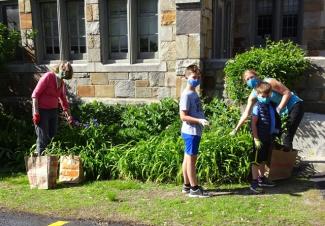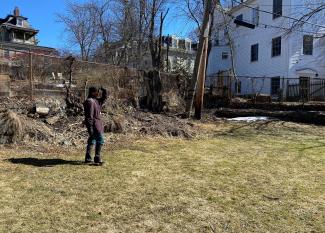In spring seasons past at Grace Church in Newton, it wouldn’t be unusual to see members of the congregation outdoors tending to the gardens of the church on family work days or on special Sundays when the church school would go out to help in the gardens under the watchful eyes of the church’s garden team.
Though the COVID-19 pandemic disrupted the congregation’s usual garden culture last year, it is making plans to be safely back in action this spring by joining the Episcopal Church’s Good News Garden movement with a community garden, thanks to a recently awarded $2,000 grant from the churchwide Episcopal Evangelism Grants Program.
Funds from the grant will be used to build some raised beds, buy a wheelbarrow, tools, seeds, tomato starts and other supplies needed to start a community garden. All of the produce that Grace Church grows in its garden will go directly to the Centre Street Food Pantry in Newton.
A garden seemed like a perfect project for this time of pandemic, Rowan Larson, the minister of Christian formation and parish administrator at Grace Church, said in a recent interview.
“We have this garden culture to start with, and we have a youth group that is really interested in direct service and outreach, and families who really want to have family-friendly service opportunities,” Larson said. “The future with COVID continues to be relatively uncertain, but because a garden is outdoors, it’s something that naturally lends itself to pretty good physical distancing and is something that people can volunteer and help with, but don’t all have to be there at the same time to do.”
With a community that’s hungry for connection and for tangible ways to be in service and to do outreach, Grace Church's hope is to plant the garden in the spring and have families or a few individuals from the congregation "adopt" a bed each week over the summer when they will check on it, make sure it’s watered and pick what’s ripe. In this way, different members of the congregation can all have some ownership in the care and the life of the garden, and have a chance to "get in the dirt with Jesus," so to speak.
“I think Jesus is in the dirt,” Larson said. “We are tending to our little corner of God’s creation in a way that lets us be stewards. We’re not trying to dominate our landscape. God told us to go out and till the soil and to be fruitful and to share, so that’s what we’re trying to do.
“The other reason I would say Jesus is in the soil with us is, Jesus was never one to walk away from getting his hands dirty. Jesus was always alongside the people that nobody wanted to touch. There’s something about coming into contact with things that society has deemed to be messy or dirty that’s really powerful, and it’s always a place where change can happen,” Larson said.
The church also hopes to use its garden as a way to invite neighbors at a nearby group home for disabled adults into community and conversation. They are planning to plant at least one bed that is wheelchair accessible and hope that the garden can be a place where they can welcome neighbors who may or may not want to attend worship services.
“Let’s meet somewhere in the middle--that’s still holy ground, that’s still sacred space, but that is more welcoming to people who might have pretty severe mental and physical disabilities,” Larson said. “I’m hoping that we’re able to offer something beautiful and lovely that our neighbors can join us in, and even if that’s just to sit in the garden and listen to the bees and look at the flowers, that’s a beautiful thing.”
Larson also sees the garden as a teaching tool to show that there’s a faith-driven and biblical reason for the garden effort, especially at a time when food insecurity has become more present for a lot of people and there is a growing consciousness of what it means to be a steward of creation and to be a part of a community.
“We’re not just growing a garden because gardening is nice, even though it is,” Larson said. “We’re not just growing a garden because we wanted to, even though that's also true. We’re doing it because God tells us to feed the hungry, to be in mutual relationship with our neighbors and to invite those who are different than us and welcome them in.”
--Bridget K. Wood
Read a recent Episcopal News Service story about the churchwide Good News Gardens initiative here. In the Diocese of Massachusetts, ministry networks are forming around Good News Gardens as well as food security issues. E-mail Martha Gardner, Missioner for Networking and Formation, at mgardner@diomass.org to learn more and get connected.


